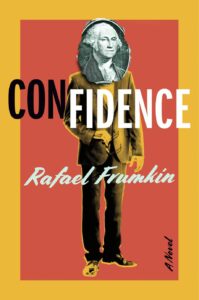Charismatic yet notorious, Orson Ortman captivates those who come across his path — and yet, he’s a con artist. Rafael Frumkin’s newly released novel, Certitude, introduces us to Ezra Green, a far-from-pristine protagonist who crosses paths with Orson at Last Chance Camp, a reform destination for wayward teens. While Ezra has a notorious online persona named Ingrid, who supposedly has an impeccable partner, things escalate when Ezra and Orson join forces post-camp to launch their money-making schemes, driven by their nascent romance.
From peddling sneakers to venturing into cryptocurrency, and appeasing senators’ lonely spouses, the duo’s turning point comes with Orson’s invention of ‘Synthesis’ — a fictitious mind-relieving process that achieves nothing more than holding your head. Teaming up with investors, they spearhead NuLife, a sham company featuring purposeless technology. As Orson becomes enmeshed in the limelight, attracting celebrities and growing his brand, Ezra begins to feel overshadowed, and NuLife’s facade threatens to unravel.
In conversation with Our Culture, Rafael details his portrayal of queer narratives, inspirations from real-life swindlers, and the placebo effect’s intriguing advantages.
Celebrations are in order for your latest book! Since your first novel, your life has seen significant transformations — how has this impacted your writing approach for your sophomore effort?
I penned an essay on this — the revelation of my transgender identity significantly broadened my perspective. The first book, though cherished, was written under the belief that I was cisgender and heterosexual, and later, merely cisgender and homosexual. It featured limited queer representation. The standout queer character did capture audience favor, which was perhaps a sign. Post-coming-out, my aspiration was clear: to compose a story where queerness was prevalent, whether pivotal or peripheral. This vision gave rise to Certitude, where incorporating queerness felt wholly organic.
In literature, queer stories often depict an idyllic existence with virtuous characters. You’ve boldly depicted these characters as flawed scammers, challenging the stereotype that queer narratives must be unblemished romance.
The creative team and I frequently discuss the novel’s placement within the queer literary scene. These characters embody queerness but extend beyond clichés — they are romantically engaged yet morally ambiguous. Their actions are driven not just by altruism but by egotistic desires. They’re not nefarious, but they’re far from saints.
I sought to infuse queer characters with complexity, avoiding the traumatic overtones prevalent in works like A Little Life. Though hardships exist, the characters’ queerness isn’t defined by suffering or calamity. It’s simply one facet of their beings.
Orson’s character — an enthralling, persuasive persona — is pivotal to the narrative. Can you share the influences behind his creation?
I drew inspiration from Dickie Greenleaf of The Talented Mr. Ripley — a figure embodying effortless charm yet tinged with an underlying darkness. Unlike Dickie, Orson evolves into a mesmerizing leader. Further inspiration stems from cult personalities, notably NXIVM’s facade. I contemplated millennial scammers: Elizabeth Holmes, Billy McFarland, Anna Delvey. Thus, Orson joined this infamous array.
Early in the novel, the duo engages in multiple minor deceptions, such as crafting feminist apparel and duping online contacts. Was it enjoyable to devise these schemes?
Absolutely exhilarating. I looked to classic con films like The Sting and Paper Moon, modernizing their antics for our era. From vintage cons to cryptocurrency gambits, crafting their misadventures was sheer delight.
The concept of Synthesis, their major fraudulent venture, plays a critical role. How did you cultivate this scam rooted in mental well-being?
There are echoes of Scientology, with parallels in their processes, yet Synthesis diverges as a pure sham hungry for cash rather than confessions. The illusion came alive, influenced by portrayals of spiritual hypnosis and the murky waters of hypnotherapy when administered by a fraudster.
As Orson’s interests drift towards Emily, an actress posing as his girlfriend, the complexity of his romantic and professional inclinations come to the fore. What is your perspective on Orson’s divided affections?
Orson’s affections are intertwined with his fluid sexuality. There’s an interplay of societal image and genuine feeling. While there’s an element of public facade, his connection with Ezra remains profound and his emotional bonds, genuine.

Ezra’s reluctance to seek medical attention seems to reveal more about his character. Is his avoidance a sign of being enmeshed in the company, or a deeper personal flaw?
It encompasses both his involvement with the company and a desire to exhibit resilience. Embracing trend-driven health fads, Ezra adopts a denialist attitude, aspiring to conquer his ailments through sheer willpower, a clear reflection of his own inadequacies and entanglements.
Ezra’s unwavering attachment to Orson, despite the fraudulent nature of their company, seems quite perplexing. Why does he persist in this relationship?
Ezra’s adoration for Orson is rooted not merely in infatuation but in an intense, inexorable emotional bond. He clings to their connection, fueled by the deep-seated belief in their shared history and abiding love.
The novel ventures into the domain of international politics as NuLife’s influence penetrates the island nation of Urmau. What motivated you to explore the political and global capitalism themes?
The detriments of global capitalism, underscored by racial and socioeconomic oppressions, are core themes. Through NuLife’s immersion into Urmau, I aimed to critique and expand upon the narrative of corporate exploitation within newly globalized contexts.
Looking ahead, what new creative endeavors can we anticipate from you?
I’m diligently crafting a novel revolving around a transgender wanderer, his misplaced dog, and a serendipitous involvement in international intrigue — an adventure I’m hopeful will come to fruition.
Certitude is readily available for readers.